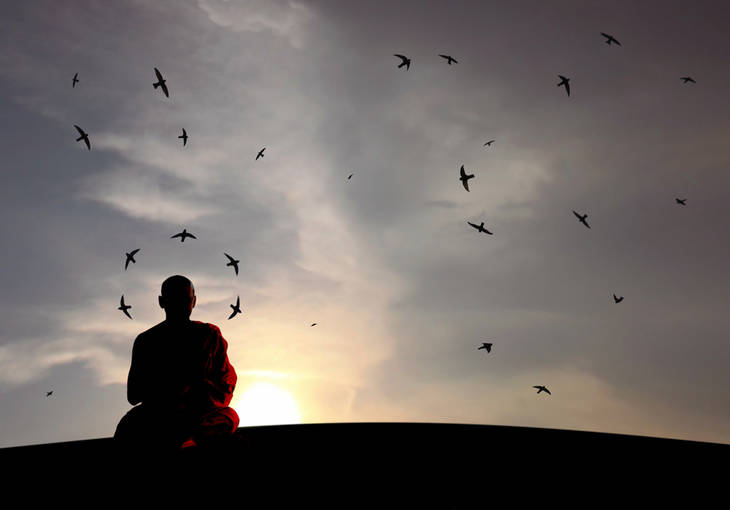A reader asks, “What does it mean to enter the house of death during meditation?” She wants to know, “Is it really possible to understand and transcend death while fully alive?”
 Without effort, goal or seeking, there are five stages of meditation, as I understand and experience it (it’s mistaken to say, ‘my experience’). The first is intense but passive awareness, which ends the observer.
Without effort, goal or seeking, there are five stages of meditation, as I understand and experience it (it’s mistaken to say, ‘my experience’). The first is intense but passive awareness, which ends the observer.
When energetic awareness catches the mind in the act of separating itself from itself as the observer, separation ends, and there is just observing.
This college professor asserts, “There is nothing beyond the observer.” By which she means we never see except through the lens of our conditioning, culture, experience and concepts. In philosophical terms, it’s the premise that humans are ineluctably hermeneutical creatures, that we always interpret reality.
The question is: “Is that true 100% of the time?” Even if it’s true 99% of the time, it means that there is the possibility of seeing nature, the world, others and ourselves directly and anew, without the filtering lens.
The Heisenberg Principle and the ‘observer effect’ are often confusedly cited as examples of either how the observer cannot be taken out of the equation, or conversely, how measurements, especially in quantum mechanics, cannot be made without affecting the systems one is measuring.
It isn’t a question of whether the observer affects measurement and outcomes at the quantum or even physical level. And physics and mathematics cannot be used to rationalize our psychological biases. The question is whether the separate observer, with all its accumulated judgments, shoulds and should nots has any actual existence.
The observer is a separative sleight of hand, a basic mechanism of higher thought. It is not in the nature of things.
The observer is indispensable to doing science, but it is indefensible in relationship to nature, others and ourselves. Essentially, the observer is the capability of separation mistakenly carried over into the psychological dimension, where it becomes division.
When one sees through a trick, it no longer fools you. Therefore the first stage of meditation is having sufficient understanding, perception and insight into the mechanism of the observer to end it.
The self cannot end it, since the self is synonymous with the observer. Awareness and attention alone ends the ancient habit of the observer, without effort or direction.
When the observer ends, and the whole brain keeps observing, attention gathers and acts on the mind-as-thought, quieting its movement. The mind falls silent. This is the second stage of meditation.
If one keeps going (again, ‘I’ am not doing anything, the brain is simply observing without separation and division), time ends. The sense and habit of becoming, of looking back or looking ahead, of associating in memory, of imagining, of moving toward some implicit or explicit goal, simply stops.
At this point, fear may arise. It’s very hard for humans to stop, and be nothing. But if one remains with one’s fear, and questions its validity, it too falls away.
Then, without any fear or morbidity, one enters the house of death.
One realizes and experiences the actuality that death is happening all around and within one every moment. Plants and animals are continually dying, replaced by new plants and animals; the very cells of our body are continuously dying, and being replaced by new cells. Inhaling and exhaling are the warp and woof of life and death.
warp and woof of life and death.
But death is much more than the micro or macro cycles of birth and death. It is the ground of existence itself, the infinite mystery from which the universe arose and into which everything in the cosmos falls every moment, and in the end, whatever and whenever the end is.
Therefore when one enters the house of death, one is actually completely at home. That’s the way it feels, and that’s the way it actually is.
When one goes that far in meditation, an unnamable sacredness often comes, something beyond all words and description.
Therefore when one makes a friend of death, one communes with God. But for any of these phenomena to occur, the conditioned lens through which one perceives nature and the world has to fall away. If you say that’s impossible, you will only see through the glass darkly, and will never commune with God, by whatever name.
Except during the deepest states of meditation, I haven’t transcended death. The brain reverts to the observer, self and time, though perhaps to a lesser degree.
The only thing I’m sure of is that complete negation and psychological death is the way ahead, the path of spiritual growth, and the never-ending journey of consciousness.
Immortality doesn’t mean never dying; immortality means dying every day, so that when one expires, there is no death.
Martin LeFevre

